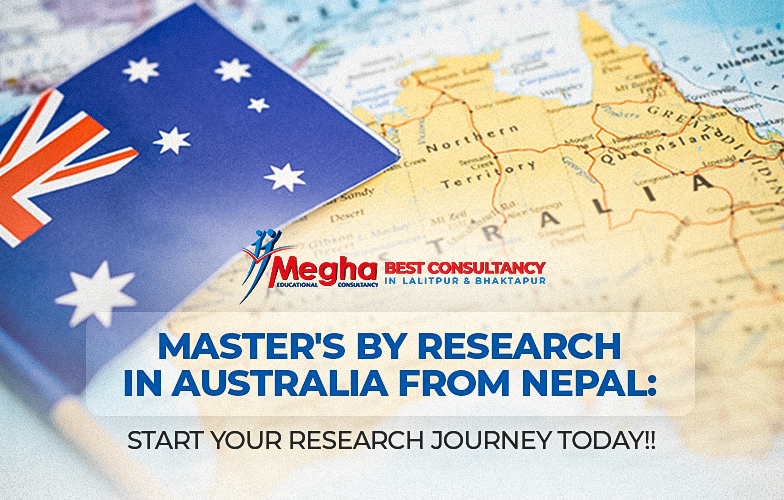Masters by Research in Australia from Nepal: Start Your Research Journey Today
Have you ever wanted to explore a subject you love, add new knowledge, and become an expert in your field? A Masters by Research in Australia gives you this opportunity. With top universities, modern research facilities, and a welcoming academic environment, Australia is a great place for future researchers.
If you’re thinking about this exciting path but feel unsure about the requirements, application process, or scholarships, don’t worry. This guide will walk you through every step, and Megha Consultancy is here to help make your dream to study in Australia from Nepal come true.
1. What is a Masters in Research in Australia?
A Masters by Research (MRes) is a higher-level degree for students who want to focus on a specific subject by doing their research instead of going to regular classes. Unlike a normal masters degree that includes studying through coursework and exams, an MRes mainly involves carrying out original research with the help of a supervisor.
Key Features:
- Research-Focused Learning: Students work on a significant research project under expert supervision.
- Thesis Submission: Completion typically involves writing a detailed thesis showcasing original research.
- Mentorship: Students receive personalized guidance from leading academics.
- Independent Learning: The program emphasizes self-driven research and critical thinking.
Masters by Research vs. Masters by Coursework
- Masters by Research: Focuses on research and thesis writing.
- Masters by Coursework: Involves structured classes, assignments, and projects.
2. Why Pursue a Masters by Research in Australia?
Australia stands out as one of the top destinations for research-focused education.
Key Benefits:
- Globally Ranked Universities: Australia is home to some of the best research institutions in the world.
- Advanced Research Facilities: Access state-of-the-art labs and technology.
- International Collaboration: Work with leading researchers from around the globe.
- Pathway to Ph.D.: A Masters in Research can lead to further academic pursuits.
- Innovative Research Opportunities: Contribute to advancements in fields like AI, climate science, and health.
- Vibrant Student Life: Enjoy Australia’s multicultural environment and stunning landscapes.
3. Eligibility Requirements for Masters by Research in Australia
To apply for a Masters by Research (MRes) in Australia, you need to meet certain academic and language requirements.
1. Academic Requirements:
- You must have a Bachelor’s degree with honors or a similar qualification.
- Some universities may accept a regular bachelor’s degree if you have strong research experience.
- Having previous research experience (such as a research project or thesis) can improve your chances of admission.
2. English Language Requirements:
Since courses are taught in English, you must show proof of language skills:
- IELTS: Most universities require a minimum score of 6.5, with no band lower than 6.0.
- TOEFL: Equivalent scores are also accepted.
- Some universities may have higher requirements depending on the field of study.
Megha Education Consultancy provides expert guidance and training for IELTS preparation, helping students achieve their required scores for admission to top universities.
3. Additional Requirements:
- A research proposal explaining what you want to study, why it is important, and how you plan to conduct your research.
- Find a supervisor who is an expert in your chosen research area and is willing to guide you during your studies.
4. Admission Process: Step-by-Step Guide
- Choose the Right University and Program: Research universities that align with your research interests.
- Document Checklist:
- Academic transcripts
- Statement of Purpose (SOP)
- Letters of Recommendation (LORs)
- Research Proposal
- Application Deadlines: Ensure you submit your application on time.
- Supervisor Communication Tips: Reach out to potential supervisors with a clear research proposal.
- Avoid Common Mistakes: Double-check documents and tailor your application to each university.
5. Top Universities for Masters by Research in Australia
Australia is home to several prestigious universities offering Masters by Research programs across various disciplines. Below is a table highlighting some of these institutions, their global rankings, and areas of specialization:
| S.N | University | Global Ranking | Specialization |
| 1 | University of Melbourne | 39th | Known for cutting-edge research programs. |
| 2 | Australian National University (ANU) | 62nd | Top-ranked for interdisciplinary studies. |
| 3 | University of Sydney | 60th | Leading in social sciences and health research. |
| 4 | University of Queensland | 70th | Renowned for environmental and biological research. |
| 5 | Monash University | 54th | Specializes in innovative technological research. |
| 6 | University of Western Australia | 131st | Focus on agricultural and marine research. |
6. Programs Offered in Masters by Research in Australia
A Masters by Research in Australia covers a wide range of subjects, allowing students to specialize in their field of interest. These programs focus on independent research rather than classroom learning. Below are some of the most popular research fields in Australia:
Popular Research Fields
1. STEM (Science, Technology, Engineering, Mathematics)
- This includes areas like computer science, physics, chemistry, engineering, and mathematics.
- Research in these fields helps in developing new technologies, improving scientific knowledge, and solving real-world problems.
- Examples: Creating renewable energy solutions, improving robotics, or developing new medicines.
2. Health and Medical Sciences
- Covers areas like medicine, nursing, public health, biotechnology, and pharmaceuticals.
- Research focuses on finding better treatments, preventing diseases, and improving healthcare systems.
- Example: Studying cancer treatments, mental health disorders, or vaccine development.
3. Social Sciences and Humanities
- Includes subjects like sociology, anthropology, history, political science, and law.
- Research explores human behavior, cultural changes, global politics, and social justice issues.
- Example: Understanding the impact of social media on mental health or studying global migration trends.
4. Education and Psychology
- Focuses on teaching methods, learning styles, child development, and mental health.
- Research helps improve educational systems and psychological well-being.
- Example: Studying the effects of online learning on students or how stress affects memory.
5. Business and Management
- Includes finance, marketing, human resources, entrepreneurship, and economics.
- Research helps businesses grow, adapt to market changes, and improve leadership strategies.
- Example: Analyzing how small businesses survive economic downturns or the impact of digital marketing on sales.
Emerging Research Fields
1. Artificial Intelligence (AI)
- Study machine learning, automation, and how AI can improve industries.
- Example: Developing AI for medical diagnosis or self-driving cars.
2. Climate Science
- Focuses on climate change, environmental conservation, and sustainable energy.
- Example: Researching ways to reduce carbon emissions or protect endangered species.
3. Data Analytics
- Involves analyzing large amounts of data to make better decisions in different fields.
- Example: Using data to predict stock market trends or improve healthcare systems.
7. Scholarships and Financial Aid for Masters by Research in Australia
Australia offers various scholarships and financial aid to help cover tuition fees and living costs. Here’s an overview of the main types available:
1. Government Scholarships
Australia Awards
- Government-funded scholarships for international students from developing countries.
- Cover tuition fees, travel costs, and living expenses.
Research Training Program (RTP) Scholarships
- Government-funded scholarships for research students.
- Cover tuition fees and provide a living stipend.
2. University-Specific Scholarships
- Many Australian universities offer scholarships for international research students.
- These may cover tuition fees and provide a living stipend.
- Examples: University of Melbourne, ANU, University of Sydney.
3. Private and Industry-Funded Grants
- Private organizations and industry groups offer grants for research projects, especially in fields like technology, health, and environmental studies.
4. Tips for Securing Scholarships
1. Write a Strong Application
- Highlight your research proposal and explain why it’s important.
- Show how the scholarship will help you reach your academic and career goals.
2. Highlight Academic Achievements
- Provide details about your previous research, grades, and any relevant awards.
8. Cost of Studying Masters by Research in Australia
Studying for a Masters by Research in Australia offers excellent academic opportunities, but it’s essential to plan for the costs involved. The total expenses include tuition fees and living costs, and both can vary depending on the university, program, and lifestyle. Here’s a breakdown of the main costs you’ll face:
| S.N | Category | Details |
| 1 | Tuition Fees | Varies by university and program. Typically between AUD 20,000 to AUD 40,000 per year. |
| 2 | Living Expenses | Includes housing, food, transportation, and other daily costs. Expect to spend around AUD 20,000 to AUD 25,000 annually. |
| 3 | Budget Management Tips | – Opt for shared accommodations to reduce housing costs.
– Utilize student discounts on transportation, food, and entertainment. |
9. Career Prospects After Masters by Research in Australia
1. Academic Roles: Shape the Future of Knowledge
- Research Assistant: Many graduates start their careers as research assistants, working alongside leading researchers to expand the frontiers of knowledge. This role is perfect for those who want to continue their academic journey while gaining valuable experience in research design, analysis, and publication.
- Lecturer/Professor: If you have a passion for teaching and inspiring the next generation of scholars, becoming a lecturer or professor could be your calling. Not only will you continue your own research, but you’ll also help students develop critical thinking skills while shaping their academic futures.
2. Industry-Specific Roles: Innovate and Create
- Research and Development (R&D): If you’ve got an inventive mind, an R&D role might be the perfect fit. Industries like pharmaceuticals, technology, and engineering actively seek skilled researchers to create new products, refine existing ones, and solve complex problems. Your research expertise will be the driving force behind the next big breakthrough.
- Data Analyst: In today’s world, data is everything. Graduates with experience in research, especially those focused on data collection and analysis, often transition into roles like data analyst or data scientist. These roles allow you to dig deep into datasets and provide actionable insights that help companies make informed strategic decisions.
3. Government Positions: Influence Public Policy
- Your research can shape the future of society by directly influencing policy development and public administration. Government roles, such as policy analyst or research officer, offer an opportunity to use your research skills to create impactful solutions that affect citizens’ lives.
- Imagine contributing to environmental policy, healthcare reforms, or education strategies—all of which rely heavily on the data and insights generated through research.
4. Pathway to Ph.D.: Reach New Heights
- If your passion for research is unrelenting, a Masters by Research is just the beginning of an academic adventure. Many students use their Masters as a stepping stone to a Ph.D.. A Ph.D. opens the door to even more advanced roles in academia, specialized research positions, and global institutions.
- Ph.D. students dive deeper into their subject, pushing the boundaries of knowledge and often contributing groundbreaking discoveries to their fields.
10. Post-Study Work Opportunities
- Temporary Graduate Visa (Subclass 485): Allows you to work in Australia after graduation.
- Pathway to PR: Steps to apply for Permanent Residency.
- Work Experience Requirements: Tips for meeting visa criteria.
11. Research Culture in Australia
Australia fosters a vibrant research culture characterized by innovation, collaboration, and support.
- Collaboration with Industry and Government Agencies: Universities in Australia often partner with industries and government bodies to develop research projects with real-world applications.
- Access to Cutting-Edge Research Facilities: Students benefit from world-class laboratories, advanced technology, and well-equipped research centers that support innovative ideas.
- Networking Opportunities: Regular workshops, conferences, and research events provide valuable opportunities to connect with peers, experts, and industry professionals.
12. Challenges of Pursuing a Masters by Research and How to Overcome Them
- Balancing Workload: Time management strategies.
- Securing Funding: Tips for finding research grants.
- Supervisor Relationships: How to maintain effective communication.
- Staying Motivated: Building a support network and setting milestones.
13. How Megha Consultancy Can Help You
- Expert Guidance: Assistance in selecting the right university and research program.
- Application Support: Help with SOP writing and research proposal development.
- Scholarship Assistance: Guidance on securing financial aid.
- Visa Application Support: End-to-end assistance with visa processing.
- Testimonials: Success stories from students who achieved their dreams with Megha Consultancy.
Conclusion
A Masters by Research in Australia offers an incredible opportunity for academic and professional growth. With the right support, this journey becomes even more rewarding.
Ready to take the next step? Megha Consultancy is here to guide you from selecting the best university to securing scholarships and visas. Book a free consultation today and turn your research dreams into reality!
FAQs About Masters by Research in Australia
1. What is the difference between a Masters by Research and a Masters by Coursework in Australia?
A Masters by Research focuses on independent research and thesis submission, while a Masters by Coursework includes structured classes, projects, and assessments.
2. What are the eligibility criteria for a Masters by Research in Australia?
You typically need a bachelor’s degree with honors or equivalent, prior research experience, a research proposal, and proficiency in English (e.g., IELTS 6.5 or higher).
3. Can international students apply for a Masters by Research in Australia?
Yes, international students are welcome to apply. Many universities offer scholarships specifically for international research students.
4. What is the average duration of a Masters by Research program in Australia?
A Master’s by Research usually takes 1.5 to 2 years to complete.
5. How much does a Masters by Research in Australia cost?
Tuition fees can vary depending on the university and program. On average, fees range from AUD 25,000 to AUD 45,000 per year for international students.
6. Are there scholarships available for Masters by Research in Australia?
Yes, there are several scholarships, including the Australia Awards, Research Training Program (RTP) scholarships, and university-specific grants.
7. Can I work while studying for a Master’s in Research in Australia?
Yes, international students can work up to 20 hours per week during the semester and full-time during breaks.
8. What are the career prospects after completing a Masters by Research in Australia?
Graduates can pursue roles in academia, research and development, government policy-making, and industry-specific research roles. It also serves as a pathway to a Ph.D.




Impressive how well this was written—clear, helpful, and interesting.
Недвижимость в Дубае — это не просто жильё,
а инвестиция в стабильность, статус и перспективное будущее.
Один из самых динамично развивающихся городов мира, Дубай привлекает внимание инвесторов,
предпринимателей и тех, кто мечтает о
жизни в современном мегаполисе с высоким уровнем комфорта.
Дубай предлагает уникальное сочетание
ультрасовременной инфраструктуры, безопасности, налоговых льгот и высокого качества жизни.
Здесь нет налога на доходы физических лиц, а покупка недвижимости может
стать основанием для получения резидентской визы.
Это делает рынок особенно привлекательным для иностранных покупателей.
Кроме того, рынок недвижимости в Дубае отличается высокой ликвидностью.
При грамотном выборе объекта можно не только сохранить, но и приумножить капитал.
Спрос на арендуемое жильё стабильно высок, особенно в районах, популярных среди туристов и
деловых путешественников. Покупка недвижимости в Дубае в
том числе покупка недвижимости в Дубае без посредников — это шаг навстречу стабильности,
высоким стандартам жизни и
новым возможностям. Будь то жильё для личного пользования
или объект для получения дохода от аренды, дубайская недвижимость остаётся одним из самых привлекательных направлений для вложений в мире.
Главное — подойти к выбору осознанно,
обратиться к профессионалам и заранее
определить свои цели и бюджет.
I’m very happy to uncover this website. I want to to thank you for your time due to this fantastic read!!
I definitely enjoyed every part of it and I have you book-marked to check out new information on your website.
Feel free to surf to my homepage: https://www.cucumber7.com/
First of all I would like to say awesome blog! I had a quick question which I’d like to ask if you do not mind.
I was curious to find out how you center yourself and clear
your head prior to writing. I have had a hard time clearing my mind
in getting my thoughts out there. I do take pleasure in writing but it just seems like
the first 10 to 15 minutes tend to be lost simply just trying
to figure out how to begin. Any recommendations or hints?
Thank you!
Visit my blog post https://www.cucumber7.com/
Game shows will certainly remain part of Australian broadcasting landscape, adapted and refreshed but fundamentally unchanged in power to entertain. https://australiangameshows.top/
Планируете отказаться от обучения? Расскажем, как вернуть деньги и избежать разочарования. https://gratiavitae.ru/
perplexity ai купить про https://uniqueartworks.ru/perplexity-kupit.html
Metabolic Freedom replaces confusion with confidence – giving you a clear path to better health. https://metabolicfreedom.top/ metabolic freedom pdf free
Casos reales, soluciones reales para mujeres que aman demasiado https://lasmujeresqueamandemasiadopdf.cyou/ libro las mujeres que aman demasiado de que trata
Discover a new solar system and a new friend. The Project Hail Mary PDF brings this adventure to you. This digital book is a great way to escape reality. immerse yourself in the world of Project Hail Mary today. https://projecthailmarypdf.top/ project hail mary (film)
With the In Your Dreams PDF, you never have to worry about damaging a book. The file is indestructible, ensuring that your copy of the story remains pristine for all time. https://inyourdreamspdf.top/ In Your Dreams By Kristan Higgins Free
When a story makes you scream, you know it is worth sharing. You can get this PDF and recommend it to your friends. It is a shareable format that makes book clubs and discussions easier. ensure everyone is on the same page with this digital version. https://youcanscreampdf.top/ You Can Scream Epub File
You can read a poem that makes you scream. This PDF collection is powerful. It is a beautiful compilation of verses. The digital format preserves the layout of the poems. A must-have for poetry lovers. https://youcanscreampdf.top/ You Can Scream Pdf Vk
Are you ready to face the truth? Born of Trouble explores the darkest corners of the soul. This must-read story is now available as a pdf for easy reading. Follow the protagonist through a series of impossible choices and see if they can survive the mounting pressure. https://bornoftroublepdf.site/ Crime Fiction Ebooks Download
For a reading experience that is smooth and enjoyable, pick this. The Love in Plane Sight PDF is the digital format of choice. It is a romance that reads easily. Get the ebook version today and relax. https://loveinplanesightpdf.site/ Love In Plain Sight Free
The Is This a Cry for Help PDF is the digital choice. This file is clear. Get the copy now and read. https://isthisacryforhelppdf.site/ Is This A Cry For Help Complete Pdf
With the chosen family pdf, you can enjoy a premium reading experience that combines the best of storytelling with the convenience of digital technology. https://chosenfamilypdf.site/ Chosen Family Print Pdf
Experience the thrill of a scandalous yet sweet romance by reading The Boyfriend Candidate. We offer a high-quality PDF version for book lovers who prefer digital formats. This story will keep you hooked from the first page to the last. access the file immediately and start your reading journey. https://theboyfriendcandidatepdf.site/ The Boyfriend Candidate Vk
I have discovered so many new interests through reading. An archive of romance covers topics from baking to history within the stories. I often find myself researching a topic after reading about it in a PDF novel, learning something new while being entertained. https://anarchiveofromancepdf.top/ An Archive Of Romance Pdf 4Shared